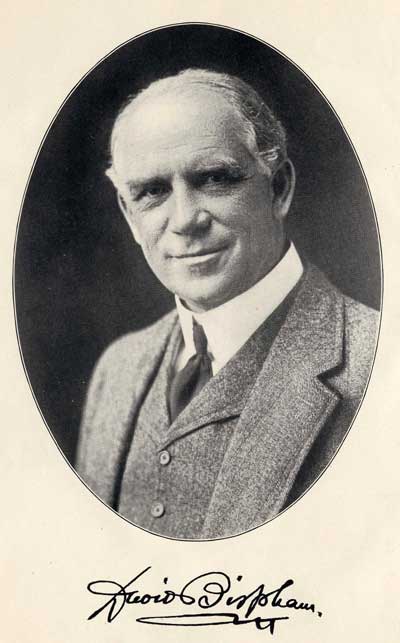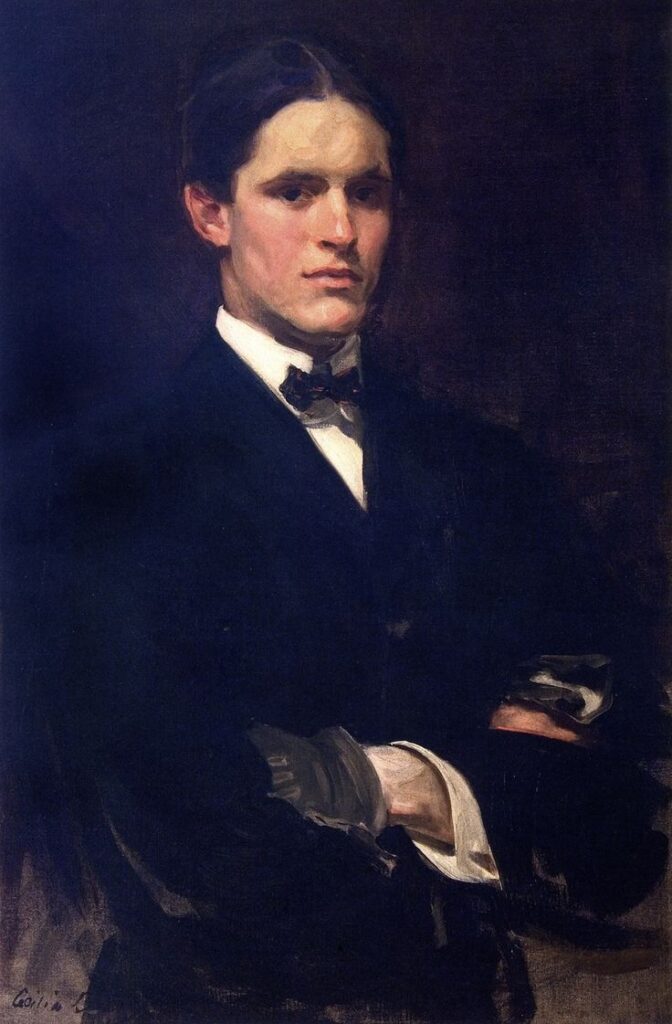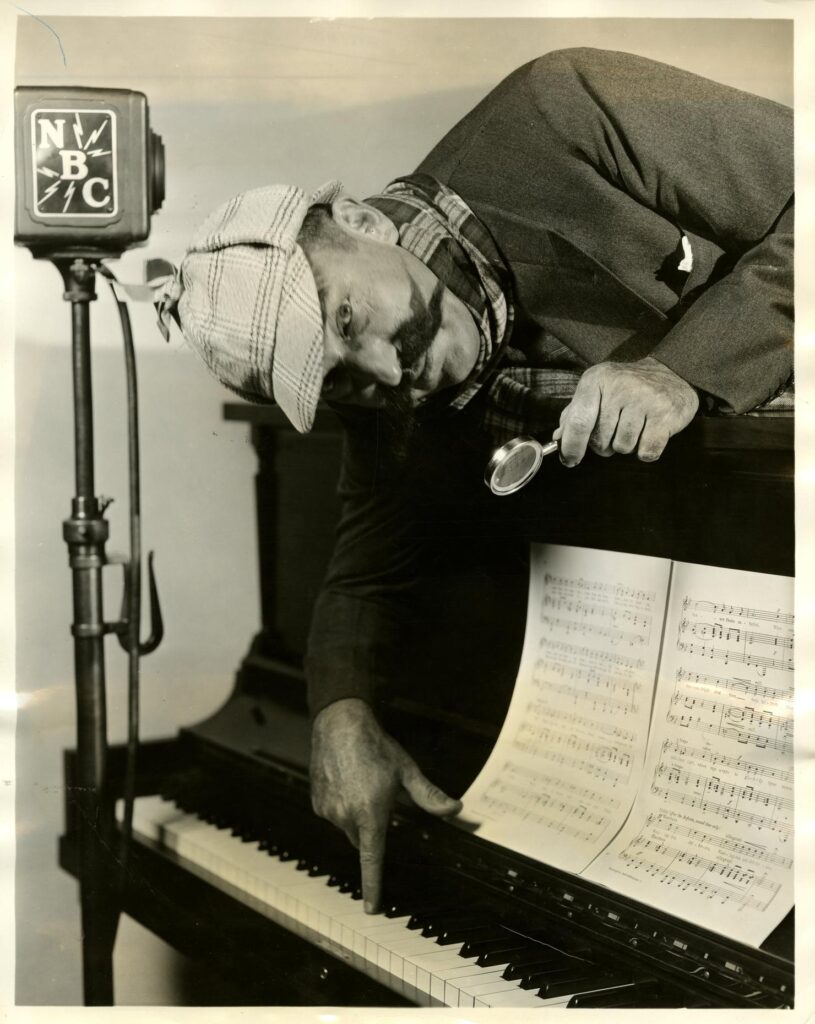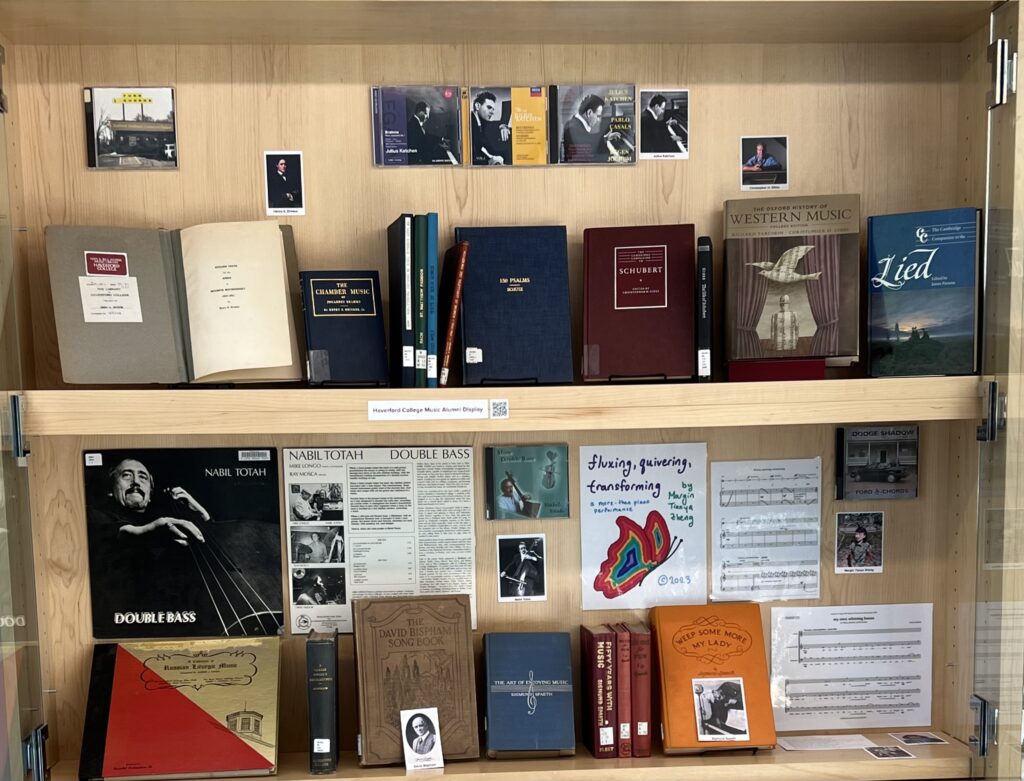Haverford College Music Alumni,
Past and Present
David Bispham

David Bispham, Class of 1876, was a child of a devout Quaker family that did not really approve of his interest in music. So, after graduation, he studied in Milan and London. He quickly found great success in Europe and America, both for his singing and acting abilities. As a singer, he was known particularly for his Wagner roles, such as Kurwenal and Beckmesser.
To further the advancement of American opera singers, Bispham founded the Society of American Singers in 1917. This organization would perform operas in English with American casts, and promoted the works of English and American composers. Today, the American Opera Society of Chicago’s highest honor is the David Bispham Medal, awarded to American opera performers and composers. His memoir, A Quaker Singer’s Recollections, is featured in this display.

Henry S. Drinker
Henry S. Drinker was not a professional composer or musician. He was actually a lawyer. However, Drinker spent much of his time working with and studying music. From 1930 to 1960, he hosted an informal gathering called the ‘Accademia dei Dilettanti di Musica’ as his home, which studied and discussed classical music from the 17th to 20th century.
Drinker also did many translations. In a period from 1941 to 1954, Drinker somehow managed to translate 212 Bach cantatas, Bach’s St. Matthew Passion, St. John Passion, Christmas and Easter Oratorios, and the Magnificat. Furthermore, in the same period Drinker translated all of Brahms’s vocal works, all of Mozart’s choral works, all of Schumann’s and Medtner’s songs, all of Wolf, Mussorgsky, and Schubert’s solo work, and Shubert’s partsongs.
He would be honored with an honorary degree from Haverford College in 1949, and serve as advisor to organizations such as the Juilliard School, Westminster Choir College, Philadelphia Musical Fund Society, and more. Today, records from his Accademia dei Dilettanti di Musica meetings can be found here, as well as works such as his Brahms translations.
Christopher H. Gibbs

Christopher Gibbs is a professor of music at the Bard College Conservatory of Music. He’s the executive director of The Musical Quarterly. He’s been involved in editing The Cambridge Companion to Schubert, Franz Liszt and His World, Franz Schubert and His World, and has authored or coauthored The Life of Schubert and The Oxford History of Western Music. He’s contributed to journals such as New Grove Dictionary of Music and Musicians, 19th-Century Music, Schubert durch die Brille, Current Musicology, Opera Quarterly, and Chronicle of Higher Education.
Christopher Gibbs is a Haverford alumnus (class of 1980), and some of his work is featured in our display today
Julius Katchen

Julius Katchen was privately trained as a classical pianist. At the age of 10, he performed Mozart’s Piano Concerto No. 20 in D minor with Eugene Ormandy and the Philadelphia Orchestra. By 12, he had given his first recital in New York. His parents would pull him from the concert scene and send him to Haverford College, however, where he studied English literature and Philosophy. He credited this broad, holistic education with adding to his musical understanding, specifically with works such as Schubert’s B-flat Sonata and Beethoven’s Diabelli Variations.
Following his graduation in 1946, Katchen was awarded a fellowship by the French government, and moved to Paris at the age of 20. He immediately found success, signing an exclusive contract with Decca Records. The young virtuoso would work with contemporary composers such as Benjamin Britten and Ned Rorem, but he was most known for his performances of Brahms. He performed Brahms solo piano music across Europe and in New York, and recorded extensively. Tragically, Katchen passed away from cancer in 1969, at the age of 42.
Sigmund Spaeth

Sigmund graduated from Haverford College in 1905, with a degree in English literature. While he was here, he played soccer and cricket. He would get his master’s degree in English here as well. He composed many songs, one of which was the ‘Haverford Harmony Song’. Spaeth would go on to have a long and storied career as a musicologist and music critic for The New Yorker, Vanity Fair, The New Republic, Esquire, Saturday Evening Post, and more. Spaeth became famous especially for his lectures, in particular his act ‘The Tune Detective’. He even performed this act at the White House for the Roosevelts and the Grand Duchess of Luxembourg in 1941. In this unscripted act, Spaeth would sit at a piano and prove how popular songs’ musical phrases could be found in earlier works. Once, in 1928, he was called to the stand in a plagiarism case as an expert witness. On the stand, with no musical instruments besides tapping and his own voice, he was able to connect “Yes! We Have No Bananas” (the song on trial) to Handel’s Hallelujah Chorus, “My Bonnie, I Dream that I Dwelt in Marble Halls”, and “Aunt Dinah’s Quilting Party”.
Spaeth’s performing talents did not just extend to music, however. Spaeth became a radio presenter in the 1920s, as the medium was just being used for the first time. He called the 1925 Rose Bowl game, ad-libbing much of the game(as he was only informed of the play’s results, not what kind of play they were, etc.) Spaeth later said he covered everything on the radio, except baseball. Spaeth would serve as president of the national Association of American Composers and Conductors for 9 years. He would play a critical role in promoting and preserving the barbershop quartet tradition, which The New York Times argued was his greatest legacy. He would die in 1965, just three months after his wife passed. He is quoted as saying, “What this country needs, in addition to a good five-cent cigar, is a lot of bad piano players, ukulele players, guitar players, and possibly saxophonists and trumpeters. I’m not so sure about violinists and cellists, for their efforts are bound to be pretty painful even to themselves.”
Nabil Totah

Nabil ‘Nobby’ Totah was a double bassist, from a Quaker school in Ramallah. His family immigrated to America in late 1944, where he attended a Quaker boarding school and then Haverford College. He graduated in the class of 1952, with a degree in political science. While he had played violin and piano before, he only started playing bass after he graduated from Haverford. Totah then played in a military band in Japan while serving in the Army. He would go on to play with Charlie Parker (briefly), Gene Kruppa, Johnny Smith, Les Elgart, Cy Coleman, Zoot Sims, Eddie Costa, Herbie Mann, Bobby Hackett, Sol Yaged, Teddy Wilson, Max Yaminsky, Benny Goodman, and Hazel Scott. He was known for his simple basslines, putting the soloist first before his own virtuosity.
Margin Tianya Zheng

Margin Tianya Zheng, HC’23, double majored in music and mathematics at Haverford. They began learning piano in early childhood, and they studied piano and harpsichord at Haverford with Anna Kislitsyna. As a composer, they explore the intersections of the personal, political, and philosophical and are interested in interdisciplinary and collaborative approaches to creation. Margin participated in the Wildflower Composers Festival in summer 2020, and this summer they will be a Composition Fellow at the Nief-Norf Summer Festival in Knoxville, TN. In their first year at Haverford, Margin was awarded the E. Clyde Lutton 1966 Memorial Fund for Performance, performing an interactive Zoom piano concert reflecting upon the need for community care in the climate crisis and coronavirus pandemic. Mildly quaint, massively quirky, and madly queer, Margin is a proud owner of emotional support stuffed animals and high-fidelity earplugs. Born in NYC and raised in Newtown, PA by Han Chinese immigrants, they plan to remain in the Philly area, working as a mathematics tutor and continuing to develop as philosopher, artist, awakener.
This is the score for Margin’s composition fluxing, quivering, transforming, which they premiered in their senior thesis recital this spring and will be performing again in June at New Music Gathering in Portland, OR.
“fluxing, quivering, transforming narrates an important aspect of my experience at college, my tightly intertwined journeys of mental illness/Madness and my gender identity, and places it in the context of my bicultural upbringing as an US-born and -raised child of Han Chinese immigrants. It paraphrases a melodic fragment of the song “Reflection” from Disney’s animated film Mulan, corresponding to the lyric, “When will my reflection show who I am inside?” Sonically it is primarily a piano piece, but it is equally a performance of and by my own bodymind: it cannot be performed by anyone besides me. There is some speaking, singing, shouting, and whispering, as well as playing on the strings of the piano by plucking and by brushing with large Chinese calligraphy brushes. In addition, towards the end I improvise upon a tarot card I select prior to performance.”
Grace Coberly

Grace Coberly is a queer composer, singer, and educator with a passion for human connection. Above all, they seek to create musical experiences that are accessible to audiences of any background. Grace’s work has been performed across the United States and Europe, including performances by the Long Beach Camerata Singers, Chelsea Randall (EXTENSITY Concert Series), the Bowling Green State University Collegiate Chorale, Clara Warnaar (International Contemporary Ensemble), and the Ohio Ambassadors of Music. They have received commissions from Chicago Fringe Opera, Latin School of Chicago, Heritage Chorale of Oak Park, IL, and All Saints Church of Worcester, MA. Recent honors include being named a finalist for the American Prize in Composition (vocal chamber music division, 2023), a finalist in in the ASCAP’s Morton Gould Young Composer Awards Competition (2022), a performance winner of the EXTENSITY Commission (2022), and a runner-up in the Women’s Sacred Music Project Commission Competition (2020).
Grace completed their undergraduate studies in music and linguistics at Haverford College, where they studied under Nate Zullinger, Curt Cacioppo, and Ingrid Arauco. They are now working towards their master’s in music education at George Mason University. An alum of Temple University’s Wildflower Composers Festival and the Eastman School of Music’s Summer@Eastman program, they will attend Connecticut Summerfest in June 2023.
Grace teaches elementary music in Massachusetts. When not making music, they enjoy doing yoga, roasting vegetables, and playing with their cat.
Ben Safran

Ben Safran’s research has been published in the Journal of the Society for American Music and Yale Journal of Music and Religion, while their compositions have been performed by musicians ranging from principal members of the Philadelphia Orchestra to grassroots activists performing a guerilla concert in a corporate headquarters lobby. They have a Ph.D. in music from Temple University and have presented research on protest music, campaign strategy, identity studies in music, music in childhood and youth culture, media studies, hermeneutics, ecomusicology, and 20th- and 21st-century concert music. They currently manage operations at the Cogut Institute for the Humanities at Brown University, and serve on the board of environmental activist group Earth Quaker Action Team.
Sources/Further Reading
- Oxford Music Online Biographies:
- David Bispham: https://doi.org/10.1093/gmo/9781561592630.article.03152
- Henry S. Drinker: https://doi.org/10.1093/gmo/9781561592630.article.08183
- Julius Katchen: https://doi.org/10.1093/gmo/9781561592630.article.14758
- Nabil Totah: https://doi.org/10.1093/gmo/9781561592630.article.J453300
- Christopher Gibbs’s page with Bard College: https://www.bard.edu/faculty/details/?id=1694
- Sigmund Spaeth New York Times Obituary: https://www.nytimes.com/1965/11/13/archives/sigmund-spaeth-musicologist-called-tune-detective-dies-classical.html?auth=login-google1tap&login=google1tap
- Sigmund Spaeth New York Times Obituary with Times Machine: https://timesmachine.nytimes.com/timesmachine/1965/11/13/issue.html
